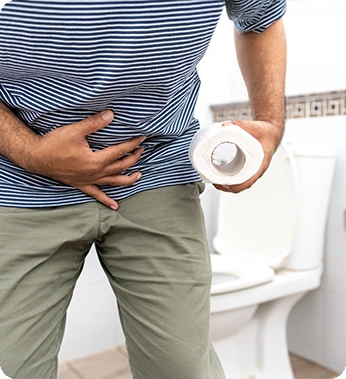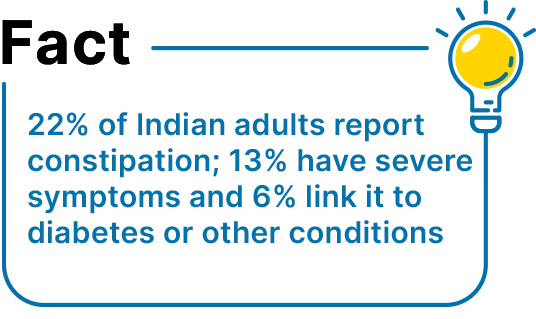
Constipation can affect more than just digestion; it can lead to discomfort, bloating, and impact your everyday quality of life. Whether it is difficulty in passing stools, infrequent bowel movements, or a constant feeling of incomplete evacuation, constipation is a common concern affecting people of all ages. From lifestyle habits to hormonal imbalances, there are multiple triggers behind this digestive issue
At Dr Batra’s®, we offer constipation treatment in homeopathy that gently restores gut balance, improves bowel regularity, and supports overall wellness. Our approach is free from chemical laxatives and works by identifying the root causes, be it stress, diet, dehydration, or digestive sluggishness. Backed by 40+ years of experience, we aim to provide long-term
At Dr Batra’s®, we go beyond just relieving symptoms, we treat the root cause. Our treatment approach for constipation in homeopathy is built on:
Expert Gastrointestinal Specialists
Experienced homeopathic doctors who specialise in digestive health
Scientific Diagnosis
AI-driven tools and in-depth consultations to identify the exact cause
Personalised Treatment Plan
Customised solutions based on your case history, stress levels, and dietary habits
Safe for All Ages
Suitable for children, pregnant women, elderly individuals, and chronic cases
With a 97.2% patient satisfaction rate, our care is trusted by over 1.5 million patients globally
A 42-year-old from Pune overcame 5 years of constipation with Dr Batra’s® homeopathy. In 3 months, she had regular bowel movements, less bloating, and stopped laxatives
At Dr Batra’s®, homeopathic treatment for constipation is designed to support your body’s natural rhythm. Instead of using temporary laxatives that can lead to dependency, homeopathy treats the actual cause, whether it’s poor digestion, emotional stress, or irregular diet
Root-Cause Healing
Remedies strengthen sluggish intestines and restore the natural bowel movement pattern
Safe & Natural Medicines
No chemicals, no dependency, only gentle ingredients from plant and mineral sources
Personalised Prescriptions
Treatment is tailored after a deep dive into your symptoms, lifestyle, stress levels, and overall health
Holistic Support
From alleviating associated issues like bloating and haemorrhoids to enhancing emotional wellness, homoeopathy works from the inside out

Note: All medicines are prescribed after detailed evaluation. Do not self-medicate
| Feature | Homeopathy | Conventional |
|---|---|---|
| Holistic relief from bloating, hard stools & incomplete evacuation | ||
| No Side Effects | ||
| Safe for Long-Term Use | ||
| Personalised Treatment | ||
| Improves Digestive Health | ||
| Suitable for All Ages |
No Dependency
Unlike laxatives, homoeopathy naturally strengthens your digestive tract
Safe for Long-Term Use
No side effects or harsh chemicals
Holistic Healing
It also helps improve digestion, reduce gas, and manage associated issues such as haemorrhoids
Stress Relief
Many constipation cases are stress-linked, homeopathy helps address that too

Dietary changes, proper hydration, regular movement, and natural remedies like homeopathy can provide effective and lasting relief without side-effects
Yes, homeopathy is gentle and safe for children. It helps restore digestion and bowel movements without harming gut flora or causing dependency
Absolutely. Homeopathy is a natural and safe option for pregnant women to manage constipation, indigestion, and other digestive complaints
No, homeopathic medicines are natural and non-toxic. They do not cause dependency, dehydration, or electrolyte imbalance like conventional laxatives
Mild to moderate cases may show improvement within a few weeks. Chronic cases take longer, but treatment is sustained and holistic